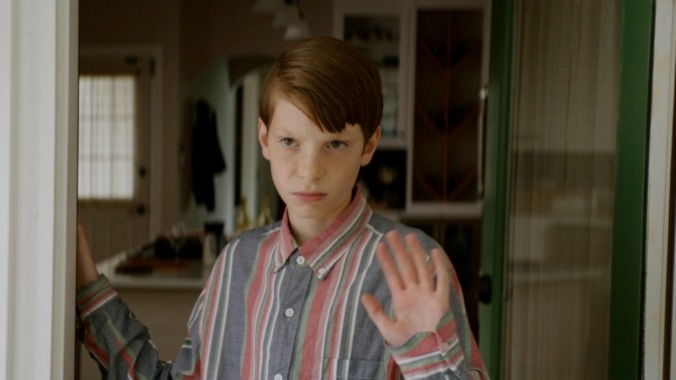Tribeca Prizewinner Griffin in Summer Finds Comedy and Drama in Bad Playwrighting

In a famous scene from Wes Anderson’s Rushmore, wannabe teenage prodigy Max Fischer (Jason Schwartzman) gets drunk and belligerent celebrating his recent success: “I wrote a hit play!” he insists, referring to the fact that his staged adaptation of Serpico seems to have been well-received (or at least tolerated) by his peers and various authority figures. Griffin (Everett Blunck), the even-younger playwright at the center of Griffin in Summer, can’t make so lofty a claim (he’s more likely to evoke Stephen McKinley Henderson’s priest in Lady Bird, sighing “They didn’t understand it”). But it’s easy enough to picture him angrily making the case that his work might clean up at the Drama Desk Awards despite its lack of popularity.
Plays seem to be why Griffin anticipates summer vacation. The break, somewhere in that middle-to-early-high-school range, allows him the fullness of the day to write, cast and tirelessly rehearse his material, all while running roughshod over his supposed creative partner Kara (Abby Ryder Fortson). From a certain vantage, Griffin looks extraordinarily lucky to have a handful of friends even half-interested in indulging his vision, even if his usual trio of actors can’t fully inhabit a story about a toxic marriage between disillusioned, possibly midcentury Manhattanites. (To be fair, Griffin’s writing isn’t necessarily up to the task, either.) But he’s become increasingly frustrated by his friends’ more traditionally social distractions, and it’s getting harder to ignore the misery of his mom (Melanie Lynskey) over his frequently absent father. So the arrival of Brad (Owen Teague), a barely-adult amateur handyman who has actually lived in New York City, puts stars back into his eyes.
Describing Griffin in Summer, which won the U.S. Narrative Feature prize at this year’s Tribeca Film Festival, as Rushmore meets Call Me By Your Name with a dash of Theater Camp would probably create too-high expectations around what is a smaller, more delicate undertaking than any of those movies – even Theater Camp, which may not be as emotionally stirring but boasts a much more filled-out cast of eccentrics. But writer/director Nicholas Colia builds out Griffin’s world slowly, and winds up with a quietly formidable ensemble.
-

-

-

-

-

-

-

-

-

-

-

-

-

-

-

-

-

-

-

-

-

-

-

-

-

-

-

-

-

-

-

-

-

-

-

-

-

-

-

-








































